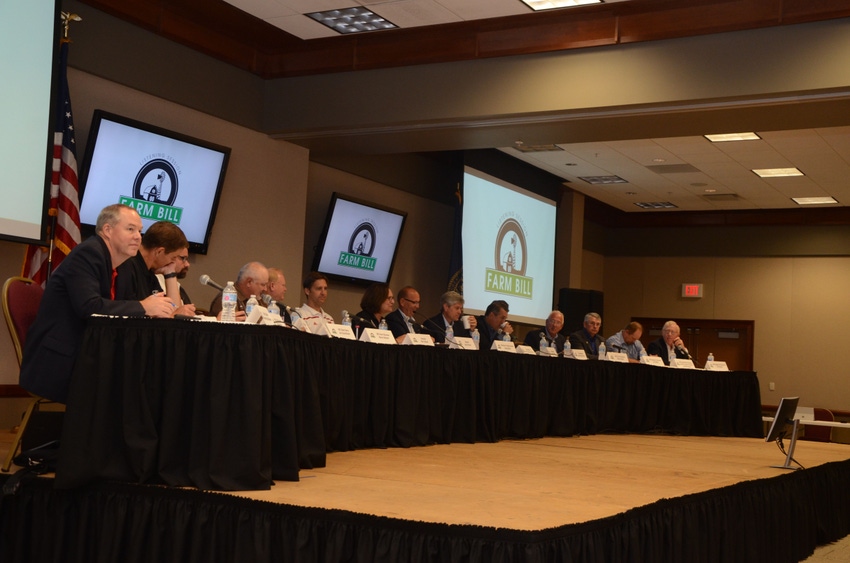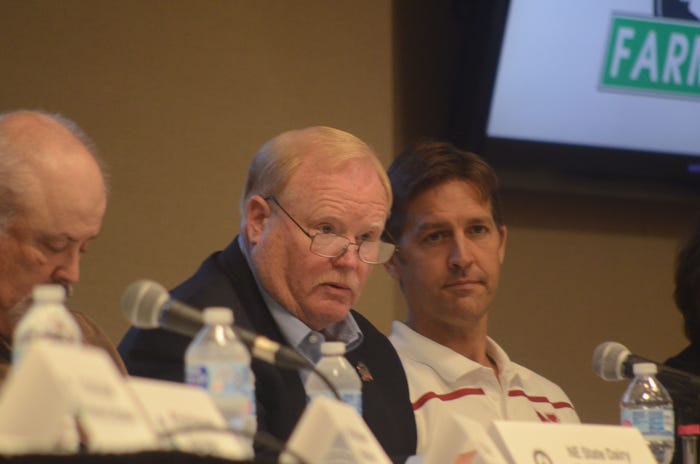
On Friday at the Nebraska State Fairgrounds, five delegates from Nebraska, including Senators Ben Sasse and Deb Fischer, as well as Congressmen Adrian Smith, Don Bacon and Jeff Fortenberry took part in a listening session to hear from different ag organizations regarding the 2018 Farm Bill.
In opening remarks, all five delegates said the No. 1 issue farmers have noted is having an affordable, viable farm safety net – including federal crop insurance and Title I commodity programs like Agriculture Risk Coverage (ARC) and Price Loss Coverage (PLC).
As Sen. Deb Fischer noted, "this won't be easy."
"We're hearing from some groups in Washington who are targeting the Farm Bill as the No. 1 program to eliminate. That cannot happen," Sen. Fischer said. "Strong and dependable crop insurance remains one of the best tools to help our producers plan for the future. Without the risk protection that's provided by Federal Crop Insurance, demands increase for ad hoc off-budget disaster assistance. That assistance is paid for entirely by taxpayers. Crop insurance on the other hand requires the farmer to pay a premium."
Sen. Ben Sasse noted there are a number of misunderstandings regarding Farm Bill funding – most, about 80% of farm bill funding goes toward nutrition programs, while 13% goes toward crop insurance and risk management programs.
Key topics of debate
Nebraska Farm Bureau Foundation president Steve Nelson, who farms near Axtell, who testified on behalf of Nebraska Farm Bureau's members, noted maintaining risk management tools like crop insurance and Title I commodity programs as a top priority.
Nelson noted in 2016, Nebraska farmers placed over 17.4 million acres – about 90% of Nebraska's total crop production acreage – into the federal crop insurance program. That same year, Nebraska farmers paid over $217 million in premiums.
"I know that there are those in Washington that have proposed cuts to the federal crop insurance program. They try to tell us that small cuts here or there won't make much difference to most farmers. It is extremely important to understand that even a small cut, or a small restriction has the potential to throw this vital program out of balance and diminish its viability for the future," Nelson said.
"This program is based on large participation," Nelson added. "Having a lot of people in agricultural participate over a wide area. It would be no different than any insurance. The more you spread the risk, the ability to keep the cost down is much greater."

PARTICIPATION MATTERS: Nebraska Farm Bureau Foundation president Steve Nelson (left) noted in 2016, Nebraska farmers placed over 17.4 million acres – about 90% of Nebraska's total crop production – acreage into the federal crop insurance program. That same year, Nebraska farmers paid over $217 million in premiums.
Steve Ebke, past president of the Nebraska Corn Growers Association who farms near Daykin, noted growers continue to support the ARC and PLC programs, but, like many farmers have attested, some changes are needed to the ARC program to make it a more viable option.
"The CBO projects that if ARC and the Price Loss Coverage program known as PLC are reauthorized without changes within the 2018 Farm Bill, most farmers would choose PLC because of the current low price environment and the established PLC reference prices," said Ebke. "We believe changes to improve the ARC formula calculations are needed in the 2018 Farm Bill, so that ARC remains a viable option. We are focused on developing recommendations to improve the ARC program to ensure it is a real choice in terms of providing comparable risk management effectiveness."
Rep. Adrian Smith noted there will continue to be critics along the way – and they will likely focus heavily on crop insurance. "I think we need to be mindful that if we want a pooling of risk, that plan, that pool to be productive and effective, we want participation, and if we begin the process by excluding or eliminating some participation I think there are some negative consequences," Smith said.
Another key area of focus is trade. Of course, trade policy isn't confined to the farm bill discussion, but delegates noted the importance of programs like the Market Access Program (MAP) and the Foreign Market Development (FMD) program as key in expanding market access around the world.
"Trade is good for America but it is great for Nebraska. Across our state, one-quarter of jobs are tied to agriculture," said Sen. Sasse. "Ag is the lifeblood of our state, but ag trade is fundamental to the basis of our economy and right now you have a whole bunch of people who are confused about how trade works, and unfortunately some of those are on the inside of the administration. The five of us on the delegation are trying to work hard to persuade these in the Administration how trade actually works."
Many ag organizations continue to support for increased funding for MAP and FMD. "These programs through private-public partnerships such as the U.S. Grains Council and U.S. Meat Export Federation are delivering $28 in exports for every $1 invested," said Ebke. "Corn industry exports are estimated to account for 30% of farm income. Our organization believes these programs are an excellent investment."
"Every other row of soybeans, every third row of corn [in the U.S. are exported]," said Rep. Don Bacon, noting the importance of working with bilateral trade agreements after the U.S. has backed out of the Trans Pacific Partnership. "We have to work hard and encourage, push our President to ensure he follows through on his promise on bilateral trade."
Long road ahead
Moving forward, it can be a challenge to put a timeline on the 2018 Farm Bill, although Rep. Bacon, who is on the House Ag Committee, is hopeful the Farm Bill will pass by the time the 2014 Farm Bill expires, or shortly thereafter. "It's hard to have a crystal ball on this. We're working hard in the committee to put it out in that time," Bacon said. "If we run behind, we won't be far behind I don't believe."
Sasse, who is no longer on the Senate Ag Committee, is less optimistic – especially given the limited availability of senate floor time. "The Farm Bill expires in September of 2018. I think the window of expectation should be September of 2018, plus 6 months beyond. The idea of going early I think would be great for stability to the market, but I think it's fair for you all to internalize the unlikelihood of that, given that it never actually happens historically."
The delegates wrapped up the session by stressing the importance of reaching out to their urban counterparts as the farm bill debate moves forward.
Rep. Fortenberry encouraged farmers, ranchers, ag organizations and other stakeholders to think about the farm bill as a continuous discussion – rather than a once-every-five-years policy debate – and to use "using the opportunity as a platform as a megaphone to speak to the importance that agriculture gives to this nation, in terms of food security, in terms of international diplomacy, in terms of innovative and exciting economy opportunities. I think that's a message we can all carry forward beyond just our lanes of debate about the policy options within the Farm Bill."
About the Author(s)
You May Also Like






